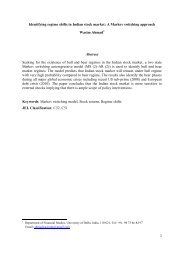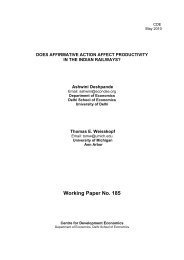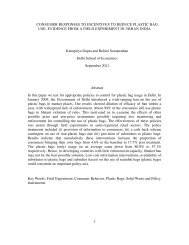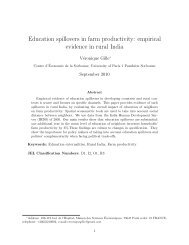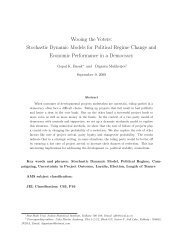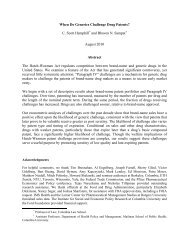Dismantling the Legacy of Caste - Centre For Development Economics
Dismantling the Legacy of Caste - Centre For Development Economics
Dismantling the Legacy of Caste - Centre For Development Economics
Create successful ePaper yourself
Turn your PDF publications into a flip-book with our unique Google optimized e-Paper software.
Abstract<br />
Public policy in modern Indian features affirmative action—policies intended to reduce persistent<br />
inequality stemming from a centuries-old caste structure. We study <strong>the</strong> effects <strong>of</strong> one such affirmative<br />
action program. Specifically, we examine <strong>the</strong> consequences <strong>of</strong> an admissions policy to engineering<br />
colleges that fixes percentage quotas, common across 214 colleges, for each <strong>of</strong> six disadvantaged castes.<br />
We have obtained access to exceptionally rich data for study <strong>of</strong> this affirmative action program—data that<br />
include <strong>the</strong> test scores that were used to administer admissions decision rules, as well as detailed<br />
independent ability metrics from high school examinations completed prior to <strong>the</strong> admissions<br />
examination. Our analysis indicates that for targeted students <strong>the</strong> program has significant and substantial<br />
positive effects both on college attendance and first-year academic achievement.<br />
1. Introduction<br />
One <strong>of</strong> <strong>the</strong> most difficult public policy issues facing any society is how to deal with an historical<br />
legacy <strong>of</strong> discrimination and exclusion based on racial, ethnic, or hereditary categories. One natural<br />
response to entrenched inequity is to implement affirmative action policies which explicitly favor<br />
historically disadvantaged groups. The hope is to level <strong>the</strong> playing field in <strong>the</strong> short term, and to affect a<br />
longer-term transformation whereby society eventually no longer needs affirmative action. 1<br />
Affirmative<br />
action policies enacted in almost any situation are bound to generate controversy because <strong>the</strong>y alter <strong>the</strong><br />
allocation <strong>of</strong> scarce resources. In <strong>the</strong> case <strong>of</strong> higher education, which we study here, <strong>the</strong> preferential<br />
admission status granted one student can result in <strong>the</strong> exclusion <strong>of</strong> some o<strong>the</strong>r student from a particular<br />
college.<br />
In addition, <strong>the</strong>re is controversy about <strong>the</strong> effectiveness <strong>of</strong> affirmative action in higher education<br />
even for <strong>the</strong> intended beneficiaries. At issue is <strong>the</strong> possibility that affirmative action can inadvertently<br />
harm targeted students by placing <strong>the</strong>m in academic programs for which <strong>the</strong>y are poorly suited, creating a<br />
―mismatch‖ between <strong>the</strong> scholastic demands <strong>of</strong> college and <strong>the</strong> academic preparation <strong>of</strong> <strong>the</strong> student.<br />
Students with weak preparation at <strong>the</strong> pre-college level, so <strong>the</strong> argument goes, cannot compete in <strong>the</strong><br />
academically challenging environment <strong>of</strong> selective institutions; <strong>the</strong>se students would be better <strong>of</strong>f in<br />
1 As Harry Blackmun famously suggested, in his legal opinion on affirmative action in higher education in <strong>the</strong> U.S.,<br />
―I yield to no one in my earnest hope that <strong>the</strong> time will come when an affirmative action program is unnecessary and<br />
is, in truth, only a relic <strong>of</strong> <strong>the</strong> past‖ (Regents <strong>of</strong> <strong>the</strong> University <strong>of</strong> California vs. Bakke, 1978).<br />
1



